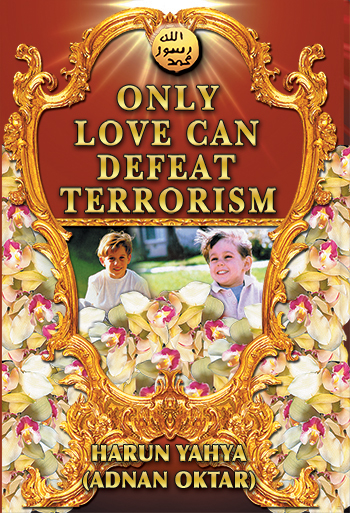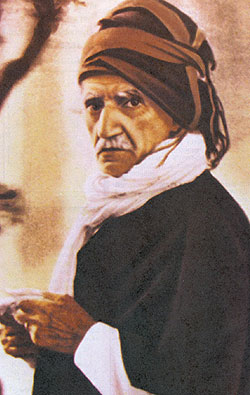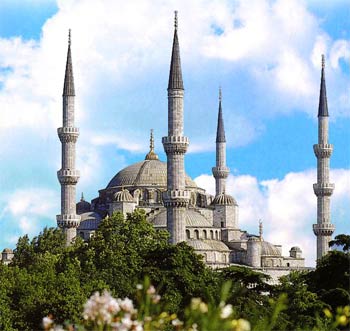Bigotry: The Dark Danger
Only Love Can Defeat Terrorism

DOWNLOAD THE BOOK
CHAPTERS OF THE BOOK
- Introduction
- The Bloody Toll of Terror
- Atheist Ideologies and the Rise of Terrorism
- Only Love Can Defeat Terrorism
- A Call to Peace: Understanding and Proper Morality in the Torah and the Gospel
- The Prophet Muhammad's (pbuh) Understanding and Loving Morality
- Solutions to Terror and Anarchy from Beduizzaman Said Nursi
- Conclusion
- The Deception of Evolution
< <
7 / total: 9
Solutions to Terror and Anarchy from Beduizzaman Said NursiThroughout history, there have been periods when the scourges of terror and anarchy have intensified, posing a threat to entire populations. Numerous solutions have been proposed. One of those who stressed the importance of an all-out struggle against terror and anarchy was the great Turkish Islamic scholar, Bediuzzaman Said Nursi (1877-1960). He said that the first thing people must do is spread the morality of the Qur'an and made a number of recommendations.
At the time Bediuzzaman lived, the world was going through radical changes. The First World War had a particular impact on his life. During the war, he had led the Ottoman militia forces on the Caucasian Front against the invading Russians for which he was later awarded a medal. He was taken prisoner in March 1916 and held in Russia for two years. In early 1918, he escaped from prison and made his way back to Istanbul via Warsaw, Berlin and Vienna. Thus he had a front-row seat to witness the collapse of the Ottoman Empire and the establishment of the Turkish Republic. He also saw the Russian Revolution bring Communism to power, the conflict between the great European powers and the difficulties that both World Wars inflicted on the Turkish Republic. As can be seen in his writings, he made a detailed analysis of all these events, evaluating all political developments in the light of the verses of the Qur'an. He always emphasized how any society that turns its back on religious morality will suffer great damage and that only if Muslims joined forces could they enjoy great success against atheist ideologies. Bediuzzaman knew that terror and anarchy would emerge in his own time, and afterwards. He therefore tried to alert people to a number of possible solutions for these terrible problems. In his words, "... Religion fiercely condemns strife and anarchy. Anarchy recognizes no rights. It turns human morality and the works of civilization into the morality of animals,"51 This was the best possible expression of Islam's views on terror and violence, which Bediuzzaman spent his life expounding. As he once said, "Patience and endurance to put a stop to anarchy and maintain public order are necessary, with all sincerity in the service of the faith. I am therefore perfectly content to sacrifice my repute to that end."52 He stated that in the fight against anarchy and terror—a fight that required patience and endurance—believers bore a great responsibility. His experience and guiding words are of great value today. We should carefully consider every statement made by this worthy individual, who spent his life trying to build a world of love and wisdom, based on the morality of the Qur'an. Only by love, Bediuzzaman always said, can terrorism be overcomeThe most noteworthy aspect of his statements is the importance he attaches to human love and life, inspired by the morality of the Qur'an. As he once said, The true lesson from the Qur'an is this: If there are ten monsters and one innocent person in a house... is it permissible to burn that house... even though the morality of the Qur'an forbids such a thing... [to] ruin ten innocent people for the sake of one monster? Would not burning that house down be the greatest possible cruelty and betrayal? ... the morality of the Qur'an forbids the endangering of the lives or the harming of the 90 percent of innocent people for the sake of the ten percent of monsters who threaten security. We must be aware that we are bound by religion to preserve security and abide by that lesson from the Qur'an...53 In these words, Bediuzzaman revealed the great importance of human life, that every possible sacrifice should be made to save the life of just one individual and that doing the opposite means committing great cruelty. Muslims should work to establish peace and security. Because that responsibility is a command from Allah, believers use all means at their disposal to help spread the morality of religion. Where terror and anarchy become terrible scourges, an environment in which Islamic morality is lived resembles heaven. Bediuzzaman said as much in a number of statements: If a Muslim departs from the Muslim community, he turns from the religion and becomes an anarchist and has a poisonous effect on society. Because anarchy recognizes no rights, and turns the proper nature of mankind into the morality of savage animals.54 A true Muslim, a sincere believer, never supports anarchy and wickedness... the religion fiercely condemns strife and anarchy. Because anarchy recognizes no rights, and turns the proper nature of mankind and the works of civilization into the morality of savage animals.55 He made it clear that conveying the morality of religion would open up a great dialogue, even in the hearts of the insensitive people , the uncompromising and aggressive. The love of Allah would keep people from all forms of tyranny. He stressed that every Muslim's duty is to relate the beauties of religion and the truths of the Qur'an, so as to bring that love into peoples' hearts. Bediuzzaman once stressed that his Risale-i Nur ("Letters of Light", a collection of all his writings) fulfilled that function: Yes, the Risale-i Nur and faith based on truth and proof and the truths of the Qur'an, explains and elucidates matters in a manner appropriate to the times and in such a way that the community can accept them, has led to millions of people examining faith and belief, awoken Islamic love and dialogue in their souls, and built a spiritual wall against atheism and immorality, the signs of anarchy. Yes, the union of the sacred ideal and purpose form an invincible force, an impassable wall, a spiritual power in peoples' souls, hearts and minds.56 The importance of Qur'anic morality in the case against terror
At every opportunity, Bediuzzaman reminded people that in the fight against terror and anarchy the most important weapon was the spread of religious morality. As he commented, Towns are also households for their inhabitants. If belief in the hereafter does not govern the members of that large family, vices like malice, self-interest, false pretences, selfishness, artificiality, hypocrisy, bribery, and deception will dominate—displacing sincerity, cordiality, virtue, zeal, self-sacrifice, seeking Allah's pleasure and the reward of the hereafter, which are the bases of good conduct and morality. Anarchy and savagery will govern under the superficial order and humanity, poisoning the life of the town. Children will become troublemakers, the youth will take to drink, the strong will embark on oppression, and the elderly start to weep.57 In societies that turn their back on religion, deceit, oppression, anarchy, violence and terror emerge. Virtues like cooperation, sacrifice and honesty go by the board. People think only of their own self-interests, desiring only their own comforts and working only for themselves. Yet when a society lives by religion, then cooperation, friendship and brotherhood prevail. Later in this same statement, Bediuzzaman gives examples of the advantages that religious morality can bring to family and social life: By analogy, the country is also a household, and the fatherland, the home of the national family. If belief in the hereafter rules, then true respect, earnest compassion, disinterested love, mutual assistance, honest service and social relations, unhypocritical charity, virtue, modest greatness, and excellence will all start to develop. It says to the children, "Give up messing around; there is paradise to be won!" and teaches them self-control through instruction in the Qur'an. It says to the youth, "There is Hell-fire; give up your drunkenness!" and brings them to their senses. To the oppressor, it says, "There is severe torment; you will receive a blow!" and makes them bow to justice. To the elderly it says, "Awaiting you in the hereafter is everlasting happiness, far greater than all the happiness you have lost here, and immortal youth; try to win them!" It turns their tears into laughter. It shows its favorable effects in every group, particular and universal, and illuminates them. Sociologists and moralists, who are concerned with the social life of mankind, should take special note. If the rest of the thousands of benefits and advantages of belief in the hereafter are compared with the five or six we have alluded to, it will be understood that only belief is the means of happiness in this world and the next, and in the lives of both.58 As these examples suggest, once people live by religious morality, it is easy to advise them, forbid them to commit evil and turn them to the true path. Bediuzzaman often said that terror and anarchy could be destroyed only if people live by the morality of the Qur'an, commanding love, understanding, peace, forgiveness, affection and compassion and standing against all forms of evil and wickedness. These words of his call on Muslims to embrace the truths of the Qur'an, again emphasizing that only prevailing religion can end anarchy in the world: The only solution to the ruin and destruction caused by anarchy, which menaces and has wreaked terrible calamities on mankind, is the eternal and timeless truths of a sacred and divine religion.59 Bediuzzaman frequently stressed that the morality of the Qur'an, and its interpretation in the Risale-i Nur made a great contribution in eliminating terror and anarchy, and would continue to do so in future. Every effort to explain Qur'anic morality and invite people to the path of true Islam helps fulfill that duty and plays an important role in the struggle against terrorism. Bediuzzaman drew attention to the importance of that: "The Risale-i Nur definitely has no connection with politics. But since it has smashed absolute disbelief, it destroys and repulses anarchy, which underlies absolute disbelief, and absolute despotism, which overlies it."60 In another statement, he sets out some essentials to get rid of anarchy: "Respect, compassion, refraining from sin, security, the giving up of lawlessness and being obedient to authority."61 Later in the same statement, he describes how the Risale-i Nur fulfills the duties it has assumed: When the Risale-i Nur looks to the life of society, it establishes and strengthens these five principles in a powerful and sacred fashion and preserves the cornerstone of public order... Over the last twenty years, the "Risale-i Nur" has made one hundred thousand people into harmless, beneficial members of this nation and country.62 Art, wisdom and unanimity of purposeIn his works, Bediuzzaman Said Nursi offers a detailed description of the form that struggle against terror, atheism, anarchy and the problems of the Islamic World should take: "Our enemies are ignorance, poverty and inner conflict. We shall fight these three foes with the weapons of wisdom, skill and unanimity of purpose."63 These vital words draw attention to three grave dangers: ignorance, poverty and conflict. It is essential to warn the public against the first of these, ignorance. In today's Islamic world, the great majority has some a knowledge of religion and belief in Allah. Yet seldom does that same majority deeply examine religion and spiritual values. Because their knowledge is generally superficial and picked up secondhand, it is impossible for them to translate religion's proper morality, in its true sense, into life. It is essential, therefore, to do away with that lack of knowledge.
The poverty of the Muslim world is the second danger Bediuzzaman cites. That poverty prevents people having a proper education and thus feeds ignorance. It also makes Muslims feel weak and thus feeds both frustration and radicalization. The third danger is the internal conflict over so many issues in the Muslim world. When parties can reach no agreement on basic values, their debate over ideas usually degenerates into hostilities, conflict and even civil wars. Compassion and mutual respect are not only inter-civilization, but also intra-civilization necessities. But the truth is that a constructive attitude can resolve these problems and conflicts. The paths of reason and conscience are one and the same. For that reason, truth needs to be stated openly, in the face of the disorder and strife that conflict brings with it. Against these three dangers, Bediuzzaman also stressed the measures needed to be taken. The first of these, art, occupies an important place and means several things: First, that people should be taught to understand beauty and esthetics. These blessings from Allah will turn human souls away from brute force. Knowing that art is a blessing from Allah, and giving thanks for it, increases people's spiritual depth. For that reason, it is most important to show the full beauty of the Allah's art all around us. Artists should act in that knowledge, and the devout need to turn to art with that same awareness. Every explanation of the morality of religion must bear artistic values in mind. It is highly important to demonstrate the believer's superior artistic understanding in all written works, with colored pictures, simple and clear language and high-quality printing. Wisdom embodied in the written word is equally a form of art. The words employed, the examples used, and the striking, effective means of expression all make a very important impression on the reader. When it comes to explaining the beauties of religion, easy means of expression, as opposed to unclear, confusing and abstruse language, make it much easier to grasp the truth and understand it. The "wisdom" Bediuzzaman refers to means the possession of knowledge. Muslims need to be the masters of knowledge in the age in which they live. That, of course, includes science and the social sciences. Because a Muslim is an earthly representative of the religion that Allah has chosen for Man, he needs to be well versed in the sciences, cultures, thought and technology of his time, as well as being able to employ that knowledge efficiently. The final method Bediuzzaman recommends, unanimity of purpose, needs to be brought about by every Muslim who wants to achieve security and well being and to see the Islamic world flourish again. History shows that unification and harmony in the Islamic world have always brought success. The golden age of the Prophet (may Allah bless him and grant him peace) and the first caliphs, the Abbasid Empire, the empire of Saladin or the Ottoman Empire; all these examples indicate that unification among the Muslims themselves created powerful and victorious, yet fair and compassionate states. In times of turmoil, both Muslims and non-Muslims suffered. Thus, a revival of the Islamic world depends on the unification of Muslims all around the globe, transcending ethnic, sectarian or social disputes. Once this is achieved, the formation of a political unity — in terms of an Islamic Union — will also be at hand. Such a Union will resolve the disputes both among the Muslims themselves and among the Muslims and non-Muslims; heal the radical elements in the Islamic world by means of education and persuasion; and establish good relations between Islamic civilization and other civilizations.
Footnotes51. Bediuzzaman Said Nursi, Tarihce-i Hayat, Isparta Hayati,p.2216 52. Bediuzzaman Said Nursi, Emirdag Lahikasi, 2 cilt, p. 200 53. Bediuzzaman Said Nursi, Tarihce-i Hayat, Isparta Hayati, p.2216 54. Bediuzzaman Said Nursi, Emirdag Lahikasi 2, p. 159 55. Bediuzzaman Said Nursi, Tarihce-i Hayat, Isparta Hayati, p.2216 56. Bediuzzaman Said Nursi, Bediuzzaman Cevap Veriyor, pp. 9-10 57. Beduizzaman Said Nursi, Risale-i Nur Collections, Rays, 11.rays 58. Beduizzaman, Said Nursi, Risale-i Nur Collections, Rays, 11. Rays 59. Bediuzzaman Said Nursi, Barla Lâhikasi - Takdim, p.1412 60. Beduizzaman Said Nursi, Risale-i Nur Collections, Rays, 12. Rays 61. Beduizzaman Said Nursi, Risale-i Nur Collections, Rays, 14. Rays 62. Beduizzaman, Said Nursi, Risale-i Nur Collections, Rays, 14. Rays 63. Bediuzzaman Said Nursi, Risale-i Nur Kulliyati II, Divan-i Harbi Orfi, Nesil Yayinlari, p. 1921 |
7 / total 9
You can read Harun Yahya's book Only Love Can Defeat Terrorism online, share it on social networks such as Facebook and Twitter, download it to your computer, use it in your homework and theses, and publish, copy or reproduce it on your own web sites or blogs without paying any copyright fee, so long as you acknowledge this site as the reference.


